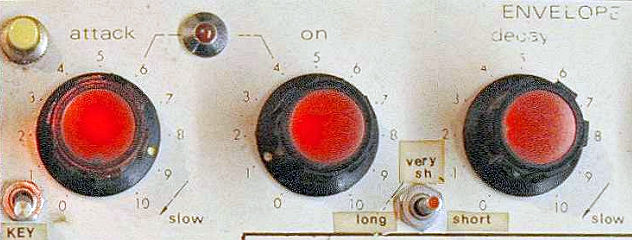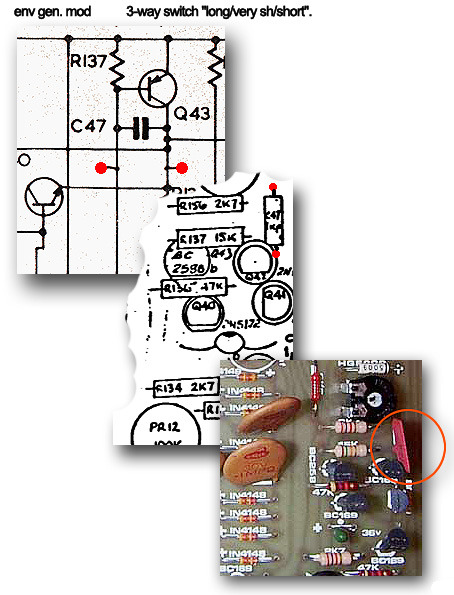
|
|
The yellow trigger-button left up is a replacement for the original red one situated next to the joystick. Because I wanted, for practical chord reasons, to move the connector for a headphone to the joystick area. The 'KEY' switch left down enables the input trigger pulse coming from the KS connector at pin 5. The 3-way switch "long/very sh/short" is an expansion of the time-range of the envelope shaper. Like with the oscillators it's just a matter of changing the value of one capacitor. In this case C47 ( 1nF ). One doesn't have to replace a capacitor. It's enough to bridge another cap on it, to get bigger values. That's why the 3-way switch provides three ranges. In center (idle) position it has the smallest cap. Both side positions add some different value to it, so a longer time range. This is on board B. |

|
|
It appears that changing the time-range cap only has effect on the Attack and Decay times. So not influencing the setting of the "On" pot. Sound examples : Soundshot 1 Source : Noise through Filter into Envelope Shaper. Matrix pins : 7 H + 10 D Setting of pots : Attack = 1, On = 0.6, Decay = 5.8 Repetition is done by the Envelope Shaper "Off" pot . At 10 ("manual") this self-triggering is disabled. Somewhere below 7.2 it will start oscillating to trigger the E.S. In this example it's set at about position 2 to get a steady repeat. The sound starts in the 'short' position, then changes into 'very short' and then the 'long' version. Soundshot 2 Same source. Setting of pots : Attack = 6, On = 1, Decay = 7, Off = 0 Extra patches to make things a bit changing : Low Osc3 triangle on filter freq. : green pin at 6 N Plus the Trapezoid voltage on the Decay : matrix pin 11 I, to get exponential slopes. To create some cohesion, the Trapezoid voltage is also controlling Osc 3 : green pin at 11 K Again, the sound starts in the 'short' position, switches into 'very short' and then the 'long' one. After the second long one, the Trapezoid is turned up to 8 before the next trigger.. |